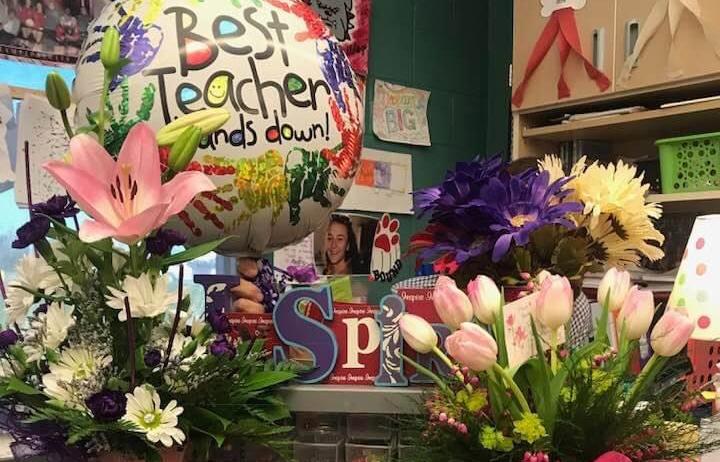
For the love of the game
Fifth grade teacher Anthonya Kahrs brings passion to the classroom every day.

Fifth grade teacher Anthonya Kahrs brings passion to the classroom every day.
When Anthonya Kahrs chose a math minor in college, she called up her former high school teacher who was in disbelief. She had always struggled in math at school. Yet somewhere along the way, through a combination of patient teachers and personal tenacity, the numbers finally made sense to her. Inspired by teachers who had helped educate and motivate her growing up, she decided to give teaching a try after graduating college. Now Anthonya teaches math and other subjects to fifth grade students.

A common theme you’ll hear from many teachers is how somewhere along their journey, they considered a different career—maybe a corporate job with the promise of a big paycheck. Instead they chose to teach because they truly enjoyed and felt gratified by it. And while you’d be hard-pressed to find a teacher who doesn’t advocate for higher teacher pay, the same educators will also tell you they love teaching.
Anthonya and many other teachers know the work they do is invaluable. This fact was made clear for Anthonya when she couldn’t come to work anymore.
The global pandemic came as a major shock to the world in early 2020, and many infrastructures spanning from healthcare to public education were not prepared to handle a disaster of this magnitude. Working parents suddenly had to become part-time teachers as public schools shut down. An article written by Business Wire, spotlights a poll showing how 80% of parents had “newfound respect for teachers” during quarantine, as they were unprepared to homeschool their own children.
From the same poll, 69% of parents believe being a teacher is harder than their current job, and 77% believe teachers should be paid more.
Teacher pay and staff shortages have been longstanding issues in public education. Both problems are especially pronounced in rural schools, according to the Colorado Department of Education, which typically receive less funding. The pandemic forced these issues to the forefront, as parents were faced with the reality of having to spend more time with their children than ever before. This article compiled humorous social media posts from parents who are finally realizing the Herculean service teachers have been doing in teaching and raising their children.
Observations 2.5 hours into homeschooling 4 kids
-teachers need to make more than professional athletes, CEO’s, and all of Hollywood combined
-homeschooling will NOT be on our future plan after this is over
-never too early for a drink— Christina Marleau (@c_marleau) March 17, 2020
Perhaps it’s unfortunate it took a global pandemic for parents to realize how valuable and simultaneous underpaid teachers are. If anything, the quarantine revealed something Anthonya and many other teachers had known all along.
Kids get sent home to get educated and then it was a real eye opener for everybody. The school was doing a lot—a lot more than teaching.
"I saw so many things where parents were like, ‘teachers should be getting paid millions a year,’” she said.
In the same breath, Anthonya will also tell you teaching is not about the money.
If I love what I’m doing every day then I’ll never work a day in my life.
For an extroverted Anthonya, teaching allows her to inspire and connect with students in a way that transcends a salary. She recalls how seeing pay increases throughout her career has made no noticeable difference in her happiness. While she downplays money as her primary motive for teaching, it takes 15 seconds hearing her speak to recognize she exudes a professionalism you’d expect to hear from someone in the corporate world.
I love the professionalism aspect of it...putting on slacks, putting on earrings and standing in front of a classroom. From the moment you get up there, you notice all the kids paying attention to you and you have to act like a role model.
In her first year at Otis, Anthonya taught her students the 7 Mindsets, a “social emotional” curriculum designed to “promote self-awareness, self-management, social awareness, relationship skills and responsible decision making" for K-12 students. One of the seven mindsets—the one Anthonya beams about when explaining—is Passion First. When teaching her students about the mindset of passion, she regularly does an exercise where she asks her students to think about what they would do if money was taken out of the equation.
I think a lot of times kids are like, ‘I’m going to be a lawyer, they make lots of money! I’m going to move to the city, there’s more money there!’ It’s all generated around this money factor. And I’ve yet to see money make somebody happy.
Through the Passion First exercise, Anthonya helps students discern what they really enjoy doing and are good at, and she helps connect students to careers that can tap into their passions. Many of Anthonya’s students are inspired by her to become teachers themselves. Others find her enthusiasm and passion infectious and want to find those things in their own future line of work.
When asked if she had any book recommendations that either helped her develop as a professional, or would help teachers sharpen their game, she pulled out several books—a few of which had sticky notes poking out from every page.
While money is not the reason she teaches, Anthonya still advocates for higher teacher pay, and also for teachers to continually develop and advance along whatever career path makes sense for them. She stresses, though, that there is no one teaching career path and those choices depend on the individual and what brings them fulfillment—just like in her Passion First exercise.
"You could have a master’s degree and teach preschool,” she said. “If that’s what you want to do and makes you happy.
In addition to teaching fifth grade, Anthonya is also an instructional coach who works alongside other teachers to help develop their craft. Her mission is to provide support and resources to other educators, which will desperately be needed in the near future.